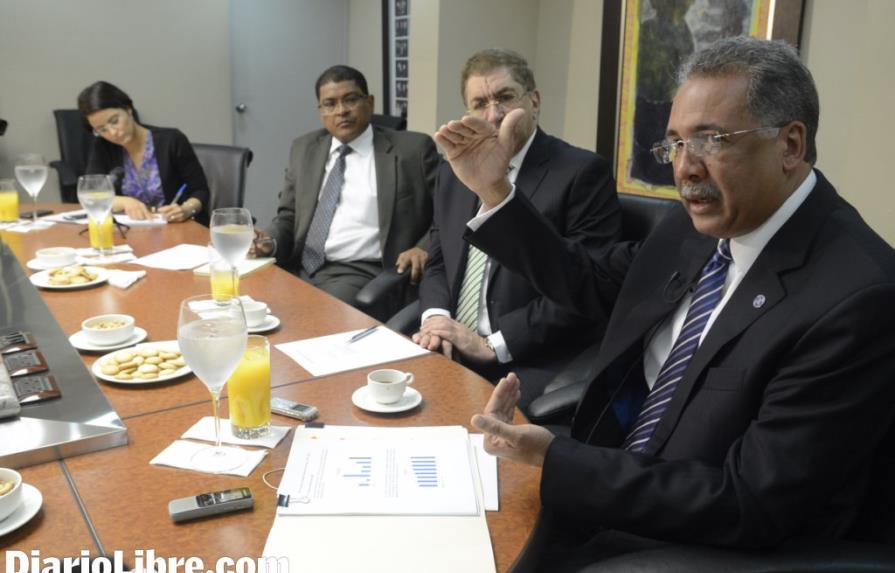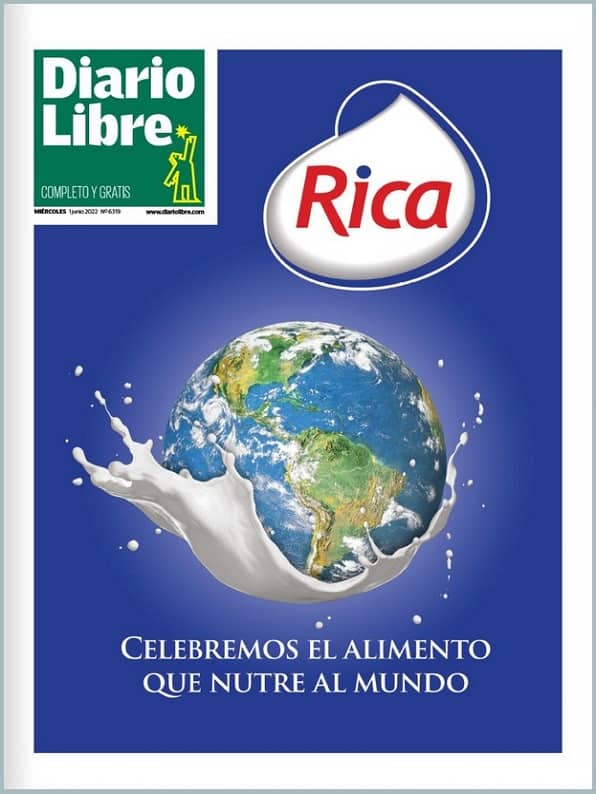Lizardo: No Fiscal Pact during this administration
Talks were deferred at the start of the administration over a lack of agreement

SANTO DOMINGO. The Minister of Hacienda Simon Lizardo, said that the invitations for the discussion and signing of a Fiscal Pact will have to wait for a new governmental administration, in spite of the fact that this was the first of the three that would form "the Great Social Pact" announced by President Danilo Medina in his inaugural address in 2012, as necessary to fulfill the objectives of reducing poverty, creating jobs and creating economic growth.
The National Strategy of Development (END), enacted on 25 January, established the deadline of no greater than three years in order to begin the talks.
During his participation in the Dialogo Libre, sponsored by the Diario Libre Group, Lizardo indicated that at the start of the Medina administration they went to the Economic and Social Council with the idea of beginning the process to reach a Fiscal Pact, but the parties could not reach an agreement, and they had to "postpone" the invitation.
"The Dominican government is not going to talk about a fiscal pact this year, in this administration. This is a later exercise for the new authorities," indicates the Minister of Hacienda.
Although Lizardo admits that the State cannot work with financial difficulties - the tax burden or the income as a percentage of the Gross Domestic Product (GDP) is at 14.1% -, he suggested that there is a lack of trust in regard to the manner in which the state handles its resources.
"There are people that (.....) believe that this is a state that is a spendthrift, wasting money. Regrettably this is a position for which we are to blame as administrative managers, and an image that should change also in the medium to long term. This will be an issue which, over time, when the people have confidence, where the public servant has to provide clear accounts, where they have to have their books open, will be resolved" he noted carefully.
At the end of January, when time was up to convene the discussion on the Fiscal Pact, the director of Internal Taxes, Guarocuya Feliz, had announced that the present administration had few possibilities to achieve it. According to the END, the Fiscal Pact will be oriented towards "financing sustainable development, and guaranteeing the sustainability in the long term, by means of a sustained support of a comprehensive fiscal restructuring and a framework of a law of fiscal responsibility."
Of US $28,994,725
ZF have paid nearly US $7 million of the debt
The Free Zone companies have paid US$6,927,983 on the principal of the US$28,994,725 that the Dominican state lent them in 2007 (by means of Law 174 - 07), according to reports from the Ministry of Hacienda. The current amount of the debt is US$22,066,742.
Minister Simon Lizardo explained that this amount was a "subsidy" in order to avoid the massive firing of employees of the sector. Lizardo said that the payments have been carried out "fundamentally" in this administration, and that so far four companies have paid their debts in full.
Government foresaw alternate sources to Petrocaribe
The Dominican government provided for alternate sources of financing to Petrocaribe in the Budget Law, just in case this agreement lowered the US$650 million forecast for 2015, due to the fall in the price of crude oil, reported the Minister of Hacienda, Simon Lizardo.
The minister explained that they thought that during 2015 oil prices would continue to be low, so that they included in the budget the possibility of placing bonds. If Petrocaribe fails "we can go to the world market, and place bonds, or in the commercial banks, and place them there," he said.
Government should discuss tax exemption policies
Each year, the State does not receive RD$200 billion because of tax exemptions to different sectors
SANTO DOMINGO. The Dominican government should discuss its policy of tax exemptions, and make accountable the companies benefited by these exemptions in order to evaluate the effectiveness of the stimulus which causes the state to lose RD$200 billion a year, according to what the Minister of Hacienda Simon Lizardo, mentioned as he took part in the Dialogo Libre.
"I believe that we have to have a different vision, a different policy of accountability. Someone gives you an exemption in exchange for what? In exchange for you to give me jobs, you contract personnel, but good jobs, jobs where the people really have spending power," he said.
Minister Lizardo explained that the government cannot take a decision arbitrarily in order to send a legislative proposal to the national Congress - where they should approve the proposals of the executive power to grant incentives - which would eliminate the tax exemptions because it would cause "misery in the sectors which are being benefited."
The policy of tax exemption has been an issue of study by international agencies. The report by the World Bank for the Dominican Republic (2014), titled "Need of fiscal space and improvement of the use of public resources," says that although it has been argued that the "tax exemptions have been established to cover the structural deficiencies which reduce competitiveness (....) they are not an appropriate tool to cover the structural deficiencies and even the most generous cannot free the government from the need to improve the business climate in general."
Tourism
Simon Lizardo explained that the tax exemptions to the tourist sector have produced good results, as he stressed that this is "an important branch of the countries income."
In 2014, tourist activity generated fiscal income for RD$6,811,470,205, according to the statistics from the Central Bank.
The National Strategy of Development (END), enacted on 25 January, established the deadline of no greater than three years in order to begin the talks.
During his participation in the Dialogo Libre, sponsored by the Diario Libre Group, Lizardo indicated that at the start of the Medina administration they went to the Economic and Social Council with the idea of beginning the process to reach a Fiscal Pact, but the parties could not reach an agreement, and they had to "postpone" the invitation.
"The Dominican government is not going to talk about a fiscal pact this year, in this administration. This is a later exercise for the new authorities," indicates the Minister of Hacienda.
Although Lizardo admits that the State cannot work with financial difficulties - the tax burden or the income as a percentage of the Gross Domestic Product (GDP) is at 14.1% -, he suggested that there is a lack of trust in regard to the manner in which the state handles its resources.
"There are people that (.....) believe that this is a state that is a spendthrift, wasting money. Regrettably this is a position for which we are to blame as administrative managers, and an image that should change also in the medium to long term. This will be an issue which, over time, when the people have confidence, where the public servant has to provide clear accounts, where they have to have their books open, will be resolved" he noted carefully.
At the end of January, when time was up to convene the discussion on the Fiscal Pact, the director of Internal Taxes, Guarocuya Feliz, had announced that the present administration had few possibilities to achieve it. According to the END, the Fiscal Pact will be oriented towards "financing sustainable development, and guaranteeing the sustainability in the long term, by means of a sustained support of a comprehensive fiscal restructuring and a framework of a law of fiscal responsibility."
Of US $28,994,725
ZF have paid nearly US $7 million of the debt
The Free Zone companies have paid US$6,927,983 on the principal of the US$28,994,725 that the Dominican state lent them in 2007 (by means of Law 174 - 07), according to reports from the Ministry of Hacienda. The current amount of the debt is US$22,066,742.
Minister Simon Lizardo explained that this amount was a "subsidy" in order to avoid the massive firing of employees of the sector. Lizardo said that the payments have been carried out "fundamentally" in this administration, and that so far four companies have paid their debts in full.
Government foresaw alternate sources to Petrocaribe
The Dominican government provided for alternate sources of financing to Petrocaribe in the Budget Law, just in case this agreement lowered the US$650 million forecast for 2015, due to the fall in the price of crude oil, reported the Minister of Hacienda, Simon Lizardo.
The minister explained that they thought that during 2015 oil prices would continue to be low, so that they included in the budget the possibility of placing bonds. If Petrocaribe fails "we can go to the world market, and place bonds, or in the commercial banks, and place them there," he said.
Government should discuss tax exemption policies
Each year, the State does not receive RD$200 billion because of tax exemptions to different sectors
SANTO DOMINGO. The Dominican government should discuss its policy of tax exemptions, and make accountable the companies benefited by these exemptions in order to evaluate the effectiveness of the stimulus which causes the state to lose RD$200 billion a year, according to what the Minister of Hacienda Simon Lizardo, mentioned as he took part in the Dialogo Libre.
"I believe that we have to have a different vision, a different policy of accountability. Someone gives you an exemption in exchange for what? In exchange for you to give me jobs, you contract personnel, but good jobs, jobs where the people really have spending power," he said.
Minister Lizardo explained that the government cannot take a decision arbitrarily in order to send a legislative proposal to the national Congress - where they should approve the proposals of the executive power to grant incentives - which would eliminate the tax exemptions because it would cause "misery in the sectors which are being benefited."
The policy of tax exemption has been an issue of study by international agencies. The report by the World Bank for the Dominican Republic (2014), titled "Need of fiscal space and improvement of the use of public resources," says that although it has been argued that the "tax exemptions have been established to cover the structural deficiencies which reduce competitiveness (....) they are not an appropriate tool to cover the structural deficiencies and even the most generous cannot free the government from the need to improve the business climate in general."
Tourism
Simon Lizardo explained that the tax exemptions to the tourist sector have produced good results, as he stressed that this is "an important branch of the countries income."
In 2014, tourist activity generated fiscal income for RD$6,811,470,205, according to the statistics from the Central Bank.


 Diario Libre
Diario Libre
 Diario Libre
Diario Libre